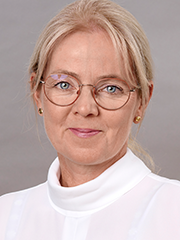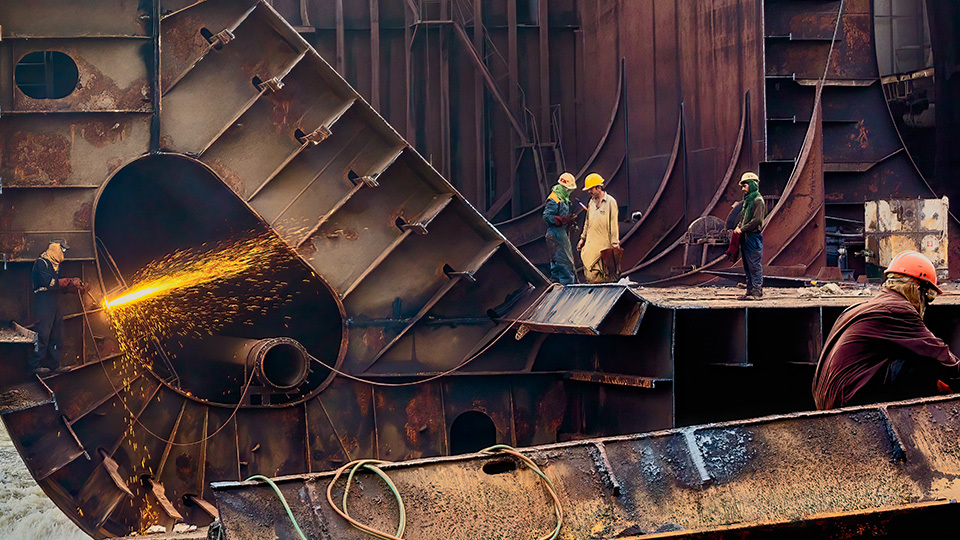
CONTACT BIMCO
Gudrun Janssens
Regional & Regulatory Manager
Brussels, Belgium
- +45 4436 6883
- gja@bimco.org

The BIMCO roundtable on safe and environmentally sound ship recycling held during London International Shipping Week highlighted the need for debunking myths around the Hong Kong Convention (HKC) and urged all stakeholders to work together to realise the convention’s potential.
Over 70 delegates joined experts from around a globe to take a thought-provoking, and sometimes provocative, look at what is needed in the next 22 months before the Hong Kong Convention enters into force. Whilst the ratification of the convention by Bangladesh and Liberia in June 2023 was a huge step forward, challenges still exist and some of these were explored during the roundtable discussions.
This overview covers some of the topics discussed and interventions made in the room. As the meeting was held under Chatham House Rule it is intended to provide a commentary on the discussions and does not attribute comments to individuals present.
The roundtable highlighted that regulation surrounding ship recycling is extremely complex. The HKC overlaps with many other global and regional rules including the Basel Convention, the Basel Ban and the European Ship Recycling Regulation and Waste Shipment Regulation.
External pressures are applied from investors, charterers, the public, governments and the non-governmental (NGO) community. The latter are thought likely to put pressure on more states to enforce the Basel Convention (including the Ban). One speaker highlighted the lobbying efforts of the NGO community with regards to enforcing the Basel Convention and the Basel Ban and how this is, and has long been, counterproductive; the Basel Convention does not address worker safety in ship recycling, nor does it concern itself with ships, or shipping, or even ship recycling.
Some clarity was provided on how the HKC recognises conventions of the other UN bodies and also relies on them. It was stressed that the HKC was developed with the cooperation of both the International Labour Organization (ILO) and the secretariat of the Basel Convention, who participated throughout the development of HKC to ensure there were no inconsistencies with the existing instruments of the two UN bodies. In fact, the HKC explicitly states in its Regulation 3 that “Parties shall take measures to implement the requirements of these regulations, taking into account relevant and applicable standards, recommendations and guidance developed by the ILO and the relevant and applicable technical standards, recommendations and guidance developed under the Basel Convention.”
It was stressed therefore that over the next two years there will be a need to seek equivalency between Basel and the HKC to ensure a global framework exists. It was also stressed that this global framework will only be successful if the EU joins forces with the IMO to enable it. It was recalled that at the Conference of the Parties to the Basel Convention (COP) 10 in Cartagena in 2011, most party States, including the EU 28, were advocating for the COP to declare that both instruments, the Basel Convention and the HKC, had what is termed in this instance an equivalent level of control.
This equivalency was supported by several interventions from the floor. Additionally, a poll of delegates in the room highlighted that this was the top priority of delegates – followed by capacity building.
More specifically the role of the IMO over the next two years was explored. This will include facilitating more states to ratify and accede to the HKC and to help states to implement it – providing support to yards and governments. The IMO SENSREC III project will kick off to specifically help Bangladesh. Additionally, there will need to be broader capacity to support enforcement by states and within other ship recycling nations such as India and Pakistan. The IMO will also need to work on the alignment of the EU regulations and the Basel Convention as well as early consideration that there may need to be amendments to the HKC which can only take place after its entry into force.
Discussions then moved on to protecting workers in the ship recycling industry and a delegate poll showed that there was only medium confidence that workers safety and rights would be addressed in the next two years. Highlighted were the needs to upgrade physical and social structures such as hospitals and accommodation, to address low wages and long working hours and the fact that permanent contracts are not in place.
Whilst South Asian States have ratified the ILO Convention there is a role to play from shipowners. one action might be to include checking whether there is a trade union for yard workers. These unions can be an indicator of good practices and provide a voice for worker in the yard. It was described how this social dialogue has been started in India but is needed elsewhere. Also, constructive meetings are starting to take place in Bangladesh. The principles of a just transition which form the basis of many climate negotiations also apply here. There is a need to transform the ship recycling industry but leave no one behind – creating an industry that is good not only for the planet but for the workers as well.
There was further exploration of progress made in India and concerns were raised about a lack of unified interpretation of the HKC within class societies. As well as a level playing field in regulation there needs to be a level playing field in how yards are assessed. It was noted that India is being pushed in the right direction by seeing improvements made in Bangladesh, and new technologies are being explored that not only that help with worker safety but that can have additional benefits such as reducing greenhouse gas emissions.
Finally, the roundtable explored some of the broader topics surrounding ship recycling. This included the work that needs to be done related to understanding the complexities around the steel economy and how ship recycling can play a role in the green steel/circular economy. With a much broader focus on life-cycle greenhouse gas emissions by the shipping industry and throughout the value chain, as well as industries gearing up on ESG reporting, a vision of a world where ESG factors are not only considered for companies or ships, but for recycling yards too, is desirable.
Authorities, as well as industries, have some urgent tasks to complete, to allow a seamless and effective entry into force of the Hong Kong Convention within less than two years.
BIMCO will continue to keep its members informed and engage with members for support as this important topic develops.